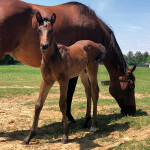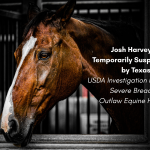Hay is a staple for horses during the winter; however, some horses may have medical conditions that prevent them from consuming hay effectively.
If your horse cannot eat hay due to issues like dental problems, respiratory issues, or esophageal disorders you need to explore alternative feeding options to ensure that your horse gets the nutrition it needs. There are various ways to manage a horse that cannot eat hay during the winter.
Feed your horse hay alternatives: There are several other feeding options available for horses that cannot eat hay, like soaked hay cubes, beet pulp, and hay pellets. Soaked hay cubes are an excellent alternative to hay as they can be soaked in water to make them more manageable for horses with dental problems. Beet pulp is highly digestible and can be mixed with other feeds to create a balanced diet for your horse. Hay pellets, much like hay cubes, can be soaked in water. If your horse needs a thinner and more liquid consistency due to esophageal disorders then this is a great option, which can help keep your horse hydrated during the winter as well.
Provide high-quality pasture: If your horse can’t eat hay, an alternative is to provide high-quality pasture. This can be difficult during the winter, but by seeding cool season grasses you can prolong grazing time for your horse. This will help keep your horses grazing and ingesting forage longer throughout the winter season than typical warm season grass pastures. Some cool season grasses are not ideal for horses with PPID or Metabolic Syndromes so make sure you discuss cool season grasses with your veterinarian, equine nutritionist, and or your extension agency to ensure you are not seeding a grass that can potentially disrupt your horse’s overall health.
Supplement with vitamins and minerals: If your horse cannot eat hay during the winter, it may not be getting all the vitamins and minerals it needs. Supplements like vitamins A, D, and E, and minerals like calcium, magnesium, and potassium, can help your horse stay healthy and avoid any deficiencies. Be sure to talk to your veterinarian about the best supplements for your horse, as they can recommend the right balance and dosage.
Feed smaller meals more frequently: If your horse has trouble eating hay, it may also have difficulty eating large meals. Feeding smaller, more frequent meals can help your horse get the nutrients it needs without putting undue stress on its digestive system.
Feeding small meals frequently can also help mimic the natural grazing patterns of horses, which can help reduce stress and anxiety. Also, consider switching your horse to a senior feed which is a complete feed. Senior complete feeds have the necessary fiber and forage content amounts horses need to keep their hindguts happy.
Keep your horse warm and hydrated: During the winter, it’s essential to keep your horse warm and hydrated. Horses that can’t eat hay during the winter may be at a higher risk of losing weight and staying warm. Provide fresh, clean water to your horse regularly, and be sure to keep it from freezing. Try adding water to your horse’s feed. This will help ensure your horse is getting adequate water, and it will also help prevent choking episodes. Additionally, it’s crucial to keep your horse warm with adequate shelter and blankets depending on the temperature and severity of the winter conditions.
If your horse cannot eat hay due to health reasons remember there are a variety of ways to manage your horse throughout the winter months. Horses are resilient, and by creating a structured routine to help these types of special- need horses thrive will help keep them from losing weight, keep their hind-guts healthy, and keep them happy throughout the winter.










